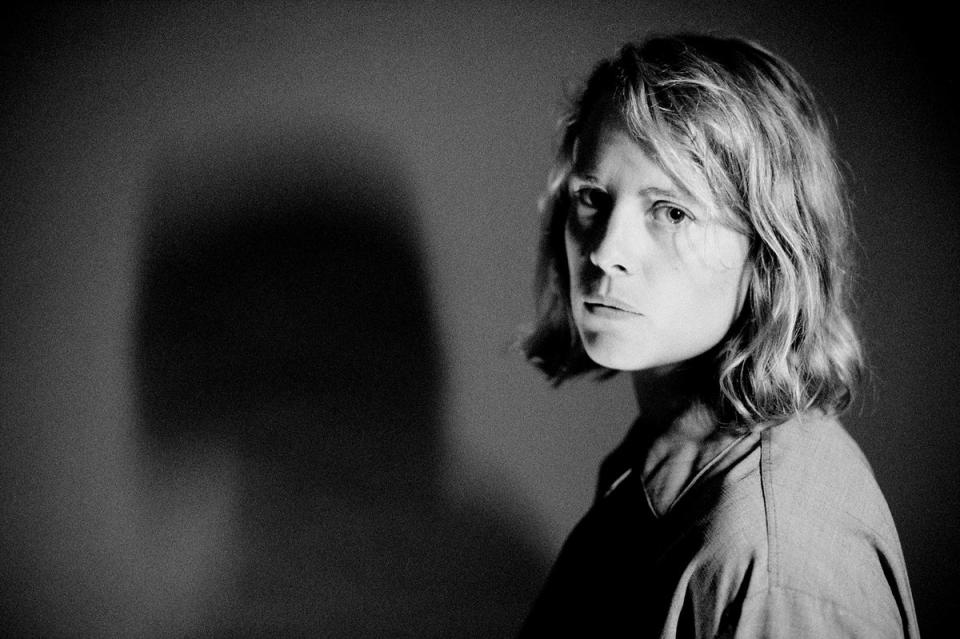Marika Hackman, indie music’s best shapeshifter: ‘Even before I came out in public, my lyrics were all super gay’

Everyone has that one big, pivotal moment in their life. Marika Hackman’s arrived early, when she was 17 years old and nearly died due to a ruptured appendix. At the time, she brushed it off in a way only a teenager could. But then came the “huge f***ing massive panic attack” that set off a lifetime of chronic anxiety. Hackman gulps down a mouthful of Guinness and sets it down on the table: “You know, I really should go get some form of therapy for that.”
Therapy’s great and all but have you tried writing a song about it? The Hampshire musician, now 31, has spent over a decade unpicking her brush with death in emotionally frank, perma-shifting music. It’s there on songs as early as 2015’s “Monday Afternoon” on which she breathes in the “sickly sweet of my rotting skin” against folky instrumentals, and it stuck around even when Hackman swung, gloriously and capriciously, into grunge-pop on her equally acclaimed follow-up records I’m Not Your Man and Any Human Friend. Hackman writes about other subjects too, namely queer desire, of which she is an astute (and blushingly explicit) observer, but the appendix episode is something she tends to circle – even when she doesn’t mean to.
Hackman’s meditative latest album, Big Sigh, falls into that category. It wasn’t until the record was finished that she realised what it was about. “There’s these organic sounds, like the string arrangements, which is how I see these sweeping landscapes of childhood: freedom, lack of responsibility,” she says. “But they rub up against these heavier industrial sounds, which is very much aligned with my adult life living in a city, dealing with the chronic anxiety and depression that crept in when I was 18. There’s a real split: there’s the before and the after.” The turning point was that first ever panic attack. “It’s weird when you have such a clear distinction, it’s like a line in the sand.”
On the softly plucked “No Caffeine”, Hackman staves off panic by reeling off a self-help to-do list: “Occupy your mind, don’t stay home/ Talk to all your friends, but don’t look at your phone.” The advice is initially set to little more than a few fluttering piano notes before a salvo of drums and an undercurrent of strings rise around her like heavy fog.
Hackman has often been described as introspective but the adjective is incongruous with the person who greets me at an east London pub with a big hug. “I think it was a lazy word that got transposed loads,” she says. “Reflectiveness isn’t the same as being introverted. Taking your time to think about what you’re saying is actually quite confident.” Hackman does take her time to answer, pausing for a few seconds each time – but never in a way that seems calculated, more like she’s sifting through her thoughts trying to get them in order before speaking them aloud.
Hackman later tells me that besides the panic attacks, she’s always been comfortable in her skin – even as a closeted teen growing up in Devon. “Maybe I’m not extroverted but I’ve always felt comfortable,” she says. “Which was helpful at school because kids are c***s.”
It must be disorienting, I suggest, seeing a gap open between how you see yourself and how others see you. “It was frustrating,” she says. “It felt very passive and I’m not a passive person, but then you have to watch it go by like a bus and hope that if you just crack on doing you, at some point it’ll change.” One tag she has managed to stamp out is songstress. Urgh. “What an interesting word,” says Hackman, narrowing her eyes. “Is it even a word? Is shoehorning someone’s gender onto something so necessary?”
The title of Big Sigh is a testament to the relief Hackman felt at finally releasing the record. She’s written whole albums in 10 months before; this one took two years. “It was my first real battle with writer’s block in 12 years,” she says. “I’m normally quite slick-wristed, but this just dragged on and then I lost my steam.” Even during the worst of it, deep down Hackman knew it would work out fine. “I’ve written about 70 songs now – why would I suddenly not be able to do this again? What would be different?” she thought to herself. “What I fear more is not wanting to write any more, like being in a relationship and falling out of love with it or something.”

Last year, she was on tour with her girlfriend Polly Louise Mackey (aka electro-pop musician Art School Girlfriend). Van life took its toll. “I imagine there’s going to be times in the next five years that are going to be the toughest they’ve been,” she says. Hackman, who did an art foundation course in Brighton, has been expanding her creative horizons lately. She recently started lino cut printing at the behest of her good friend and fellow Hampshire native Laura Marling. The process involves carving shapes out of a slab of linoleum with a scalpel. “F***, it’s so satisfying,” she laughs.
Personally, Hackman came out in 2014. Publicly, it wasn’t until 2017 with the release of I’m Not Your Man. That album, replete with grungy guitars and female pronouns, announced her sexuality to the world – something she hesitated to do because she feared it would define her as a musician. “I mean, even before that, my lyrics are all gay as f***,” she says. “It was all queer longing, big time, but just not so on the nose.”
Hackman’s relationship with Mackey is the stuff of gay indie-pop legend. So, too, was her relationship with Amber Bain aka The Japanese House, which ended in 2018 after four years. “We dealt with it well, and we’re still really good friends,” says Hackman now. They’ve both written songs about one another since. Is it tricky territory to tread – writing a song about a girlfriend or an ex? “I never want to make someone upset with something I’ve written but also at the same time, you can’t just be nicey-nicey at the cost of writing arresting, honest music,” she says. “I’ve been in relationships with people who couldn’t give a s*** – and I myself don’t mind it. Dating musicians, I think it’s very important to make a pact that they don’t get offended by anything you write and vice versa. Because otherwise, you’re hemming someone in creatively – and that’s not right.”

Hackman isn’t the type to be hemmed in. Though Big Sigh veers from the lip-curling come-ons and sexy irreverence of Any Human Friend, it still drips with desire. On “Slime”, she serenades a stranger, “I wanna rearrange you/ Climb your spine and shake your mind/ Slide back and feel your bones crack.” It’s about the fall-out that came with the beginning of her new relationship. “When we first got together, it was a slightly tricky situation and people got upset and people got pissed off,” she says. I suppose the music crowd in London is pretty small, I say. “Yeah, especially for lesbians,” she laughs. “It’s fine now, but it was so interesting that in that initial lust-filled insanity, we were also dealing with this crazy response. I hadn’t experienced something like that before.”
Typically, Hackman’s love songs tend to be about an amalgamation of relationships as opposed to any one specific person. “All my exes are gonna come around my house with pitchforks,” she jokes. But the truth is, she’s a romantic. “Always have been,” she smiles. “I didn’t come out until I was 19 so I just had these deep secret crushes on girls, and when it’s secret you don’t really get to flex it, so I went through school just harbouring these feelings.”
Secrecy begets intensity – or as Hackman puts it, “Having a secret crush is like edging yourself constantly.” It took some time for her to come to terms with the fact it couldn’t always be starry-eyed, lust-filled bliss in a relationship. “Stability isn’t appealing when you’re young,” she says. “You want it to stay at 100 miles per hour and when it doesn’t, you think something’s wrong – but then you live and you learn, and I realised that I can actually get s*** done and have someone I love.” She widens her eyes in mock shock. “Can you believe it?” Now, she lives a picture of domestic bliss in east London with Polly and their dog, Sonny.
Having a secret crush is like edging yourself constantly
Hackman’s candour is endearing – and encompassing. She loves to sing about blood and guts; bones and bodily fluids; skin and s***. Across Big Sigh, blood runs “fat and red”, feet are “greasy”, and arms are “breaking”. On the multi-textured “Vitamins”, Hackman sings, “Mum says I’m a waste of skin/ A sack of s*** and oxygen.”
“Water, blood, guts, sex, and slime is stuff we all have,” she insists. “I like universal topics that connect us, especially the ones people don’t want to talk about.” It’s funny, Hackman adds, that we as humans feel so ashamed of something that unites us. “Why do we always want to feel we’re better than the sum of our parts? For f***’s sake, s***ing is literally the one thing we all do in the same f***ing way.”

Given her taste for the grotesque, it’s interesting that Hackman can’t stomach horror movies – she does, however, love to read Wikipedia synopses of every single one. “I have always had a really profound reaction to violence in films,” she says. “It makes me incredibly, deeply sad. I’d get this knot in my stomach deep down and feel depressed for a long time.” Whether that knot comes from an empathetic place or a fearful one, Hackman is unsure.
Big Sigh found Hackman in a reflective mood. The writer’s block meant she had to reach further back in her past for inspiration. “The fact some of these emotions aren’t so immediate doesn’t negate their poignancy or intensity,” she insists. “They’re just buried deeper; and if Any Human Friend was peak queer then this is peak me. I’m not inhabiting any kind of persona with this record. There’s none of that. It’s the closest I’ve got to that ideal I’m trying to get to in terms of honesty and openness.” She pauses. “Still, I think I can go further.”
‘Big Sigh’ is out now via Chrysalis Records


